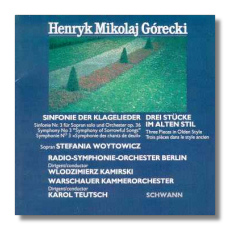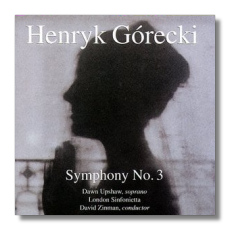
The Internet's Premier Classical Music Source
Related Links
- Górecki Reviews
- Latest Reviews
- More Reviews
-
By Composer
-
Collections
DVD & Blu-ray
Books
Concert Reviews
Articles/Interviews
Software
Audio
Search Amazon
Recommended Links
Site News
 CD Review
CD Review
Henryk Mikolay Górecki

Symphony of Sorrowful Songs
- Symphony #3, Op. 36
- 3 Pieces in the Olden Style for String Orchestra
Stefania Woytowicz, soprano
Berlin Radio Symphony Orchestra/Wlodzimierz Kamirski
Koch Schwann CD311041H1 ADD 54:05


- Symphony #3, Op. 36
Dawn Upshaw, soprano
London Sinfonietta/David Zinman
Elektra Nonesuch 79282-2 DDD 53:43


- Symphony #3, Op. 36
- 3 Pieces in the Olden Style for String Orchestra
- Amen for Chorus, Op. 35
Stefania Woytowicz, soprano
Polish Radio National Symphony Orchestra/Jerzy Katlewicz
Olympia OCD313 AAD 1987 68:34
The phenomenal – and entirely unpredictable – success of the Third Symphony, the "Symphony of Sorrowful Songs", of the Polish composer Henryk Górecki demonstrates that it has touched something in the heart of the CD-buying public. Over 60,000 people have bought copies of one version alone, the first recording to appear on CD, on the Elektra Nonesuch label. But it was swiftly followed into the charts by another performance, and now there is a third. What is it about the music that has produced this extraordinary reaction, and which of these three CDs is the one to have? And who, first, is Górecki?
That's the question that is most easily answered. Henryk Mikolay Górecki was born in Czernica, in the south-west of Poland, in 1933 and studied with Boleslav Szabelski at the Katowice Conservatory from 1955 to 1960, becoming one of the most prominent composers in the vigorous avant-garde in Poland in the late '50s and early '60s. His earlier compositions are for a wide range of forces, and include works for orchestra, piano, chamber combinations, chorus. Górecki's First Symphony dates from 1959 and is scored for strings and percussion; #2, the Copernican Symphony, was first performed in 1973 and, like #3, uses the voice: there are parts for soprano, baritone and chorus. But neither of them provoked a reaction like the Third, which was written towards the end of 1976 and is dedicated to the composer's wife.
Górecki's Symphony #3, Symphony of Sorrowful Songs, Op. 36, consists of three very slow movements, all marked a qualified Lento. Each features the lamenting voice of a solo soprano over long-held pulsing string lines, based on immense phrases in the base. The musical material itself is very simple, as is Górecki's use of it. The work begins with a modal melody in the double-basses, the tune adopted from the folk musicians of the Tatra Highlands who had earlier so much impressed Szymanowski. It serves as the basis for an instrumental canon, each entry a fifth higher and spread over four octaves, in the Aeolian mode, on E. At the centre of the canon the soprano enters, singing a setting of a fifteenth-century Polish text known as the "Holy Cross Lament", and at its climax the canon returns, gradually building down into the basses, to end as it had begun. The second movement sets a text by an eighteen-year-old Polish girl, Helena Wanda Blazusiak, composed in harrowing circumstances: she scratched it on the wall of a Gestapo cell in Zakopane, in the Tatras, a resort where in happier times Szymanowski had spent lengthy periods towards the end of his life. Górecki invests her simple words ("Mother, please do not cry. Queen of Heaven, virgin most pure, protect me always") with a simple dignity that is deeply affecting and maintains this mood in the third movement, the lament of a mother over her dead son; Górecki estimates that the text dates from the First World War, and the melody is from his native Opole region. The music as a whole is suffused with a sort of abstract folk feeling, like a religious experience that achieves its intensity through the simplicity of its musical means. In this it is a direct descendant of Szymanowski's Stabat Mater, inspired by similar material, and where the composer likewise conceals the complexity of his art to produce music that is very directly affecting. The Polish title of the work contains an archaism that neither English, French or German manages to translate, but which suggests verbally the timelessness that the music evokes.
The Symphony of Sorrowful Songs first appeared on a Koch Schwann LP in the mid-70s and circulated quietly, impressing those who knew it but not stimulating the kind of response it has done nearly two decades later. It is that recording that is the latest to appear on CD, on the same label: that marvellous soprano Stefania Woytowicz appears with the Berlin Radio Symphony Orchestra, conducted by Wlodzimierz Kamirski. For years it seemed, to western audiences at least, that the music was Woytowicz's alone: nothing came along to challenge her. But it was the American soprano Dawn Upshaw who started the Górecki ball rolling with the first recording to appear on CD, on Elektra Nonesuch, and this is the version that has headed the classical charts. It was recently joined by another Woytowicz recording, more recent, and better filled, on Olympia. All three recordings have obvious qualities, which makes the choice between them far from clear-cut. First, Woytowicz's first recording, made in 1976. Her voice is glorious: rich, dignified, austere, with a wide vibrato that doesn't trouble the listener one whit, and I have often wondered she isn't better known. Kamirski's orchestral contribution is tight and unindulgent (and with textures as broad as these, Romantic breadth could be a problem); it may even be a bit tight, for he is a full eight minutes quicker than David Zinman on Elektra Nonesuch. In her second recording Woytowicz's voice isn't quite the instrument it was: musically as responsive to the music as ever, it is nonethless showing wear, with some distinct fraying at the edges; the Polish Radio National Symphony Orchestra of Katowice is conducted by Jerzy Katlewicz, who is only two minutes swifter than Zinman. The Olympia CD is withal the best filled: the simple but affecting Three Pieces in Olden Style for strings (1963) that feature on the Koch CD can also be found here, conducted on both by Karol Teutsch (for Olympia in 1970, for Koch twelve years later), but joined by the closely focussed Amen for chorus that Górecki composed in 1975, just before the Third Symphony. Both Woytowciz versions contrast strongly with Upshaw and Zinman, who conducts the London Sinfonietta. Upshaw has a purer tone, less individual and therefore less intrusively personal than her Polish rival. But the voice is not entirely reliable: it reminds me a bit of an old Simca that my parents used to drive – very smooth most of the time, but between 60 and 70mph the steering column would begin to shake rather. And when Upshaw has to hit a phrase with any kind of vehemence she loses her normal smoothness. The orchestral sound is very different, too. The power of the Berlin and Katowice full-orchestral versions gives way to a clarity of texture that they lack. You can hear things with Zinman and the Sinfonietta that you can't with the others – the piano chords just before the soprano's first entry, for example, tell here much more than elsewhere.
So a final choice becomes difficult, and boils down to individual preference. Woytowicz I is probably the classic performance. Woytowcz II isn't in her own earlier league, but comes on the best-filled disc which thus gives you a wider overview of Górecki's musical profile. And Upshaw and Zinman offer a transparency that can't match the punch of the recorded sound on the other CDs but outshines them in delicacy. If, threatened with knives, I had to make a final choice, it would be for that first Woytowicz recording. But no choice is costless.
Copyright © 1993, 1996, Martin Anderson




















